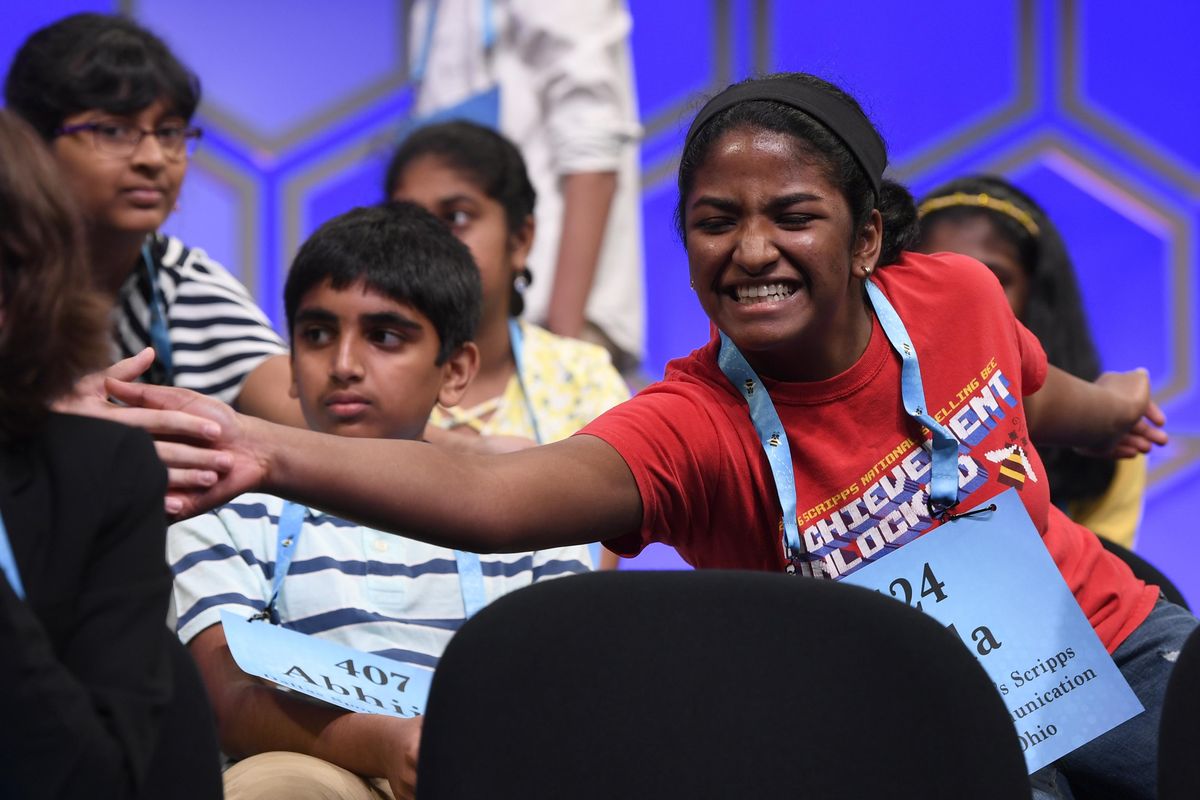Too good: Top spelling bee kids humble dictionary in finals

OXON HILL, Md. – The kids were just too good.
Eight spellers were better than the dictionary. They were better than anything the Scripps National Spelling Bee could throw at them. And they all ended up with a hand on the trophy.
In the most extraordinary ending in the 94-year history of the competition, the bee ended in an eight-way tie on Thursday night. The eight co-champions spelled the final 47 words correctly, going through five consecutive perfect rounds.
Each will get the full winner’s prize of $50,000 in cash.
They are: Rishik Gandhasri, Erin Howard, Saketh Sundar, Shruthika Padhy, Sohum Sukhatankar, Abhijay Kodali, Christopher Serrao and Rojan Raja.
The finals turned into a slog on Thursday, with bee organizers unable to scour Webster’s Unabridged dictionary for words challenging enough to narrow the field efficiently.
It started routinely enough, with 10 of the 50 spellers exiting the stage in the first round. Then the kids started schooling Scripps.
In the next round, only six spellers were eliminated. The following round saw five more depart. Four left in the round after that, and at that point, spellers had been on stage for 4 hours, 45 minutes.
Scripps and broadcast partner ESPN prefer to bring about a dozen spellers into the prime-time finals, so the bee continued as the prospect of a lunch break became an afterthought.

Finally, in the fifth round of the session, some spellers withered. Eight of the first 16 were eliminated, and the tension in the room diminished a bit as the break drew near. After nearly 5 1/2 hours onstage, 16 spellers advanced to prime time, including seven who did it last year and two – 14-year-old Howard of Huntsville, Alabama, and 13-year-old Padhy of Cherry Hill, New Jersey – who made it for the third consecutive year.
No matter what languages of origin were called upon – Yiddish, Afrikaans, Russian, the dreaded “unknown” – spellers were up to the task.
Among the words that might sound impossible to the TV audience but are considered by elite spellers to be near-layups: “maxixe,” “oeillade,” “Gebrauchsmusik,” “Seychellois.”
Kaplan, a 13-year-old from Davie, Florida, had a mic-drop moment, showing off the depth of her knowledge of roots. Given the word “varsovienne,” she asked: “Is this most likely from the Latin place name ‘Varsovia,’ meaning Warsaw?”
Why, yes. Yes it is.
Parents shook their heads, amazed by their kids’ depth of knowledge. Former spellers griped on social media that the words were too easy.
Perhaps one reason for the spellers’ performance: the burgeoning industry of spelling coaches and study guides that promise to crack the code of the bee. Thirteen of the 16 prime-time finalists and 38 of the 50 overall used study materials from SpellPundit, a business started by teenage ex-spellers Shobha Dasari and her younger brother, Shourav. The Dasaris offer a money-back guarantee if Scripps uses a word that’s not included in their guides.
“It’s all the spellers’ hard work,” 18-year-old Shobha said. “We just give them the words.”
Hayden seventh-grader makes top 50
Twelve-year-old Joseph Moran, of Hayden, competed in the Scripps National Spelling Bee in Washington, D.C. He was just one of four Idaho spellers to make it there.
When asked by KREM News about if he’s fazed by having to spell in front of crowds and cameras, Moran said: “That kind of thing tends to affect a lot of people, but it’s never really had an effect on me. I’ve always been pretty able to just ignore all the lights and cameras and just focus on the pronouncer and the word he’s giving me.”
Moran was eliminated Thursday morning after making it into top 50, when he misspelled “cyclamen,” a genus of species of perennial flowering plants. He did, however, correctly spell “Ottawa” and “cirrocumulus” in prior rounds.